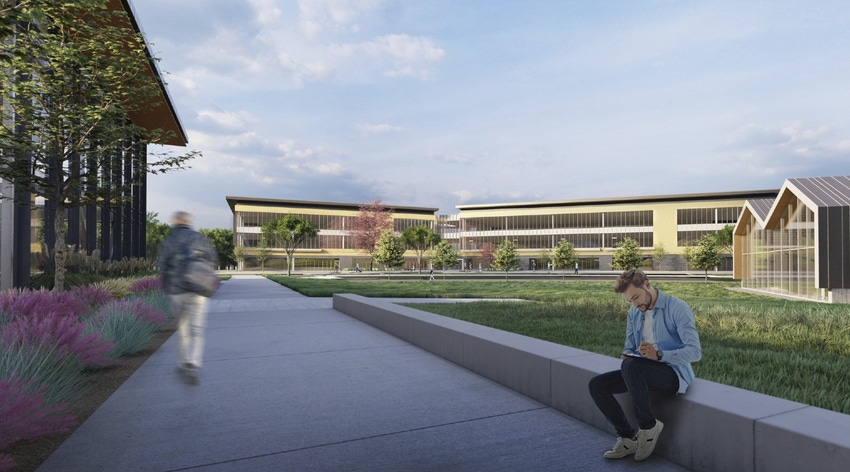
Ever since it was established in 1959 through the efforts of North Carolina Gov. Luther Hodges and hundreds of scientists, politicians and business leaders, Research Triangle Park has led the way in global ag innovation.
And now 60 years later, a new initiative is paving the way for the Research Triangle to once again lead the way in global agriculture. Alexandria Real Estate Equities, a real estate investment trust focused on life sciences, has established a first-of-its-kind campus in Research Triangle Park, designed to help new ag startups to grow.
It is known as the Alexandria Center for AgTech — Research Triangle Park. As part of the move, John Dombrosky, who led the area’s AgTech Accelerator, will now be integral to Alexandria’s increased focus on agtech. He serves as senior vice-president of agtech at Alexandria Real Estate Equities and Alexandria Venture Investments.
It is located in a state-of-the-art facility at 5 Laboratory Drive in Research Triangle Park that provides 175,000 square feet of laboratory, greenhouse and office space for small ag startups to become established and grow. Phase Two of the project will continue through next year when an adjacent building is expected to open at 9 Laboratory Drive and will provide an additional 160,000 square feet of leasable space.
“This is a way for Research Triangle Park to lead the way in the development of talent and capital to accelerate agricultural innovation,” Dombrosky said in an interview with Southeast Farm Press.
A key part of the effort is the Launch Labs accelerator program where a small team can rent office, laboratory and greenhouse space to build their venture.
“Let’s say three graduate students just got out of North Carolina State University and have an idea for a new crop protection product. They have the idea, they have grant funding, they have venture funding and they have seed funding, they just need a place to get started and see if their idea will work. That’s what Launch Labs is all about,” Dombrosky says.
The key is to help the startups create products that will work for farmers, be affordable and receive regulatory approval. “In the end, if the research doesn’t translate into a real product that’s going to make the difference in the lives of farmers, then you are asking the wrong question. You need to ask how will the farmer benefit,” Dombrosky says.
The idea is for these small startups to lease space at Alexandria for up to two years where they can continue their research, get capital and develop a business plan to bring a product to market. “It’s a way for these startups to avoid the pitfalls that many early-stage startups face,” Dombrosky says.
After they become established, they can lease more space from Alexandria as they continue to grow and hire more people. “They can grow into a 20-person then a 150-person company. Alexandria AgTech will have the capacity in this ecosystem to accommodate them. That is the vision,” Dombrosky says.
Dombosky says Alexandria Center for AgTech Research is designed to be first class all the way. A hotel-style lobby will encourage collaboration among tenants and a first-class restaurant with high quality food will help entrepreneurs work together. The lobby is expected to be completed before the end of this year while the restaurant should open next year.
Meeting rooms and a fitness center have already been completed, in addition to offices, greenhouse and laboratory space. The first phase located at 5 Laboratory Drive in Research Triangle Park is already fully leased and Alexandria is accepting tenants for the second phase at 9 Laboratory Drive.
Companies already operating at 5 Laboratory Drive are UPL, Boragen, Elo Life Systems, Greenlight Biosciences, Indigo Ag and Syngenta. The current LaunchLab tenants are Vindara, working on genetics for indoor agriculture; Resilient Biotics, working on the animal microbiome; and Sound Agriculture, working on biological crop inputs.
Dombrosky says the sky is the limit for companies that can work on the campus. He says they develop innovations ranging from robotics to the microbiome to crop genetics. Work can range from pest and disease management to boosting yields and lowering production costs.
“For row crop farmers and other farmers to receive the benefits of new soil health mechanisms, new digital ag solutions, new crop protection solutions and new genetic solutions, it will come from new and. different sources and places such as this,” Dombrosky says.
Dombrosky is optimistic that both 5 Laboratory Drive and 9 Laboratory Drive, when fully open and operating by the end of 2020, will lead the way in soil health, animal health and indoor agriculture.
“The global food system is really complex. There will be a lot of different ways to apply technology in order to nutritiously feed two to three billion more people. That is our goal,” Dombrosky says.
An important goal is to compress the amount of time it takes to bring a new product to market. “It can take up to 20 years to bring a new product to market. That’s too long. Alexandria Center for Ag Tech can help these startups move quickly and bring new products into the hands of famers much more quickly, Dombrosky says.

About the Author(s)
You May Also Like






